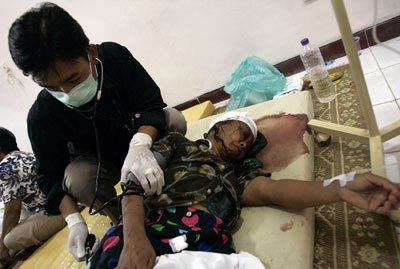Asia-Pacific
Indonesia quake: UN aids come, gov't lows toll to 4351
(AP)
Updated: 2006-05-29 14:19
 |
Large Medium Small |
A U.N. plane loaded with tents and emergency gear landed near Indonesia's quake zone on Monday as survivors cleared debris or stood on roads lined with crumpled buildings pleading for money to buy food.
 An earthquake victim receives treatment at a hospital in Yogyakarta, central Java, May 29, 2006. Tens of thousands of homeless survivors of an earthquake that killed more than 5,000 people in Indonesia spent the night camped out in the rain as aid from across the world arrived on Monday. [Reuters] |
The government lowered the official death toll from Saturday's 6.3-magnitude quake on Java island from nearly 5,000 to 4,315, after revising figures for the hard-hit district of Klaten, said Andi Hanindito, the Social Ministry's head of emergency relief.
An estimated 200,000 people have been left homeless, most of whom are now living in shacks close to their former homes or in shelters put up in rice fields. Hospitals overflowed with bloodied survivors.
As aid began to flow, relief vehicles clogged the main road leading to the quake zone.
"The access to remote areas is very difficult, these roads are quite narrow. It's creating some sort of bottleneck to deliver supplies," said Paul Dillon, spokesman for the U.N.-affliated International Organization of Migration.
Some villagers had received clothing and food, but most were still fending for themselves more than 48 hours after the quake struck, turning their homes into piles of brick, tiles and wood in less than a minute.
"All our valuables are gone," said Hardadi, as she cooked breakfast for three families living under a shelter made from fertilizer sacks. "But at least we managed to get the children out alive."
The aid plane, chartered by the U.N.'s children agency, arrived in the city of Solo, around three hours from the hardest-hit district of Bantul. It was loaded with large bags to hold water, tents, stoves and cooking sets that officials said would be distributed later Monday.
On Sunday, three U.N. trucks brought high-energy biscuits to some of the worst-hit districts and two Singapore military cargo planes arrived at Yogyakarta airport with doctors and medical supplies.
Hundreds of villagers lined main roads in the disaster zone, holding out donation boxes. They explained that any money collected would be used communally to buy rice, oil and candles.
"We need help. Anything at all," one sign read.
Saturday's quake was the fourth destructive temblor to hit Indonesia in the last 17 months, including the monster that spawned the December 26, 2004, Asian tsunami that killed 230,000 people, most of them in Indonesia.
The country also is battling a spiraling human bird flu case load, a spate of terror attacks by al-Qaida-linked Islamic militants and the threat of eruption from Mount Merapi, just north of the quake zone.
Many survivors worked together to clear the rubble and salvage building materials to build temporary shelters and health centers. One old lady was collecting pieces of broken glass from a path _ a real health hazard given that so many survivors are without shoes.
"The people here have the spirit to rebuild their lives," said Prapto Warsito, a village chief. "They have a long tradition of working and living together."
In one village, women brought their children to a well inside a damaged house, and threw buckets of water over them as they stood on piece of broken table.
"All we need now is a comb," joked one woman, who appeared in good sprits despite losing her father and home to the quake.
Electricity and water supplies are still down in much of the region, while torrential rain that has fallen at least twice since the disaster has added to misery facing survivors.
The area affected by Saturday's quake stretched across hundreds of square kilometers (square miles) of mostly farming communities to the south of the ancient city of Yogyakarta.
Countries across Asia and the world have pledged millions of dollars, tons of supplies and hundreds of personnel _ and Indonesia said late Sunday it would allocate US$107 million (euro84 million) to help rebuild over the next year.
Indonesia, the world's largest archipelago, is prone to seismic upheaval due to its location on the so-called Pacific "Ring of Fire," an arc of volcanos and fault lines encircling the Pacific Basin. It has the largest number of volcanos in the world _ 76.